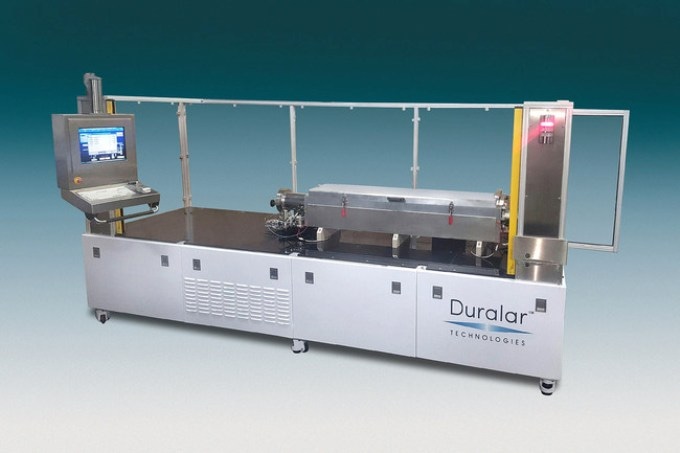Apr 4 2017
 Duralar's new CS-50 system deposits ultra-hard metal coatings. (Credit: Duralar Technologies)
Duralar's new CS-50 system deposits ultra-hard metal coatings. (Credit: Duralar Technologies)
Duralar Technologies, Tucson-Arizona based developer of advanced, ultra-hard metal coatings and coating machines has recently launched the Duralar® CS-50 deposition system. The CS-50 is capable of coating both the inner and outer surfaces of metal parts, using an exclusive process called DualArmor™.
The CS-50 system features a tubular processing chamber that opens like a clamshell, allowing metal parts to be placed inside for coating. DualArmor coating employs a unique Hollow Cathode PECVD process to bathe the parts in an extremely intense plasma — roughly 1000 times greater than a standard CVD plasma — and this enables parts to be coated at an unprecedented high rate. Also, the chamber eliminates the line-of-sight limitations that spray-type coatings have. Since all deposition occurs within the dense plasma, all part surfaces — interior, exterior and complex 3D shapes — are coated with high uniformity, eliminating the need for post-processing rework.
Tom Casserly PhD, Duralar CTO
Casserly explained that Duralar’s Plasma Enhanced Chemical Vapor Deposition (PECVD) process produces a pendulum-like motion of high-energy electrons moving back and forth between the sides of the chamber (the cathode), with the two ends of the chamber acting as the anodes. Within the chamber, high-energy ionized gases are used to clean, form an adhesive bond, and deposit ultra-hard coating on the parts.
Due to the CS-50’s unparalleled deposition speed, thicker hard coatings can be used now, which was not technically possible or commercially feasible earlier. Before, conventional Diamond-Like Carbon (DLC) coatings had a practical total thickness limit of about 5 µm; but now the new Duralar DLC coatings can be 50 µm or more. Furthermore, conventional DLC coatings had to be deposited one or two atoms at a time, which would then take over eight hours to finish a process containing 1 µm of DLC. Duralar’s latest DualArmor™ technology can deposit superior-quality DLC numerous times faster — about 15-20 µm per hour. It is also capable of significantly higher rates.
The company highlighted that the new DualArmor coatings can provide over 10,000 times greater wear resistance than 304 stainless steel and 5 to 10 times the hardness of carbon steel. The coatings offer high levels of erosion and corrosion resistance and are practically frictionless, possessing a friction coefficient of <0.08. Due to their carbon content, the coatings provide natural lubricity, which in some applications can remove the need for oils or other lubricants. All Duralar coatings are eco-friendly, benign and chemically inert. By modifying their recipes they can be customized to address specific application needs.
The new Duralar® CS-50 system is specifically built for high throughput in volume-coating environments, with volumes determined by coating thickness and size of parts. The CS-50 chamber is 60” long x 10” in diameter, and coatings can be over 50 µm in thickness. Special chamber shields have been provided to prevent coating of the system’s chamber walls. Plus, the used shields can be swiftly changed following each run and can be later reworked and reused.
The CS-50 has in-built next-generation software and offers smart operator interface, streamlined machine operation, and advanced process control. Recipes help to automate coating processes, allowing easy transfer from Duralar’s R&D center to customer sites worldwide. The DualArmor process is identical to Duralar’s patented InnerArmor® process, which is intended for coating just the insides of components, such as industrial pipes. The InnerArmor® process is applied by the Duralar® CS-10 system, which uses the tubular metal component itself as the deposition chamber. It can coat very high aspect ratios in tubulars and pipes of industrial lengths.
Duralar ultra-hard coatings are used to improve performance and prolong the longevity of components and equipment in a wide range of applications — in industries such as automotive, mining, firearms, oil and gas, chemicals, aerospace, consumer products, medical, textiles and more.